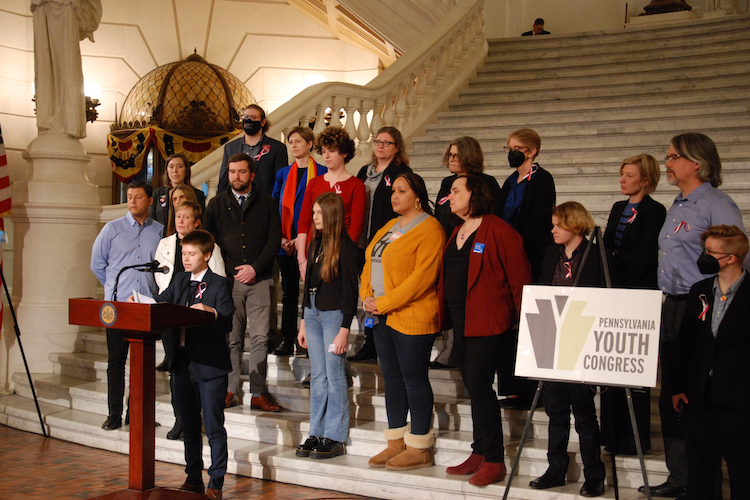News & Politics
House panel advances bill to ban trans women from women’s school sports teams

State Rep. Barbara Gleim speaks during an event at Central Columbia High School Commonwealth Media Services
Despite facing opposition from LGBTQ advocates before the meeting even began, a GOP-led House panel approved legislation on Tuesday aiming to ban trasngender women from competing on women’s high school and college sports teams.
The legislation, sponsored by state Rep. Barbara Gleim, a Republican from Cumberland County, would make Pennsylvania the latest in a series of states to prohibit transgender women from playing on women’s school sports teams. Gov. Tom Wolf is expected to veto the bill if it reaches his desk.
Supporters of the legislation say the bill would keep interscholastic sports fair, competitive and protect female athletes from athletic advantages possessed by transgender women. Efforts to ban transgender students from playing on teams that match their gender identity, however, have been met with scorn from LGBTQ advocates who have framed such legislation as an attack on LGBTQ individuals.
Gleim, who is sponsoring the bill along with four other women, said transgender women hold an unfair advantage over cisgender women, pointing to Lia Thomas, a collegiate transgender swimmer at the University of Pennsylvania, as an example.
“Allowing biological males to compete in women's sports reverses nearly 50 years of hard-earned advances for women and destroys fair competition in women's athletic opportunities,” Gleim said in committee. “Biologically, males and females are different. This fact simply cannot be reversed through surgery or changes in hormones.”
Gleim’s legislation, House Bill 972, requires school sports teams to be explicitly designated as male teams, female teams or coed teams, and must be based on an athlete’s biological sex at birth. The bill goes on so state that teams designated for women or girls “may not be open to students of the male sex.”
The bill also prohibits government entities and athletic associations from hearing complaints or opening investigations into schools for establishing separate teams based on biological sex.
State Rep. Mark Longietti, the top-ranking Democrat on the House Education Committee, said Gleim’s legislation would usurp the authority of the state’s athletic governing bodies. “When we get out of our lane we have the tendency to do things that can cause more harm than good,” he said. “That's dangerous when our actions affect children and young adults in their nurturing years.”
The American Civil Liberties Union of Pennsylvania opposes the bill, calling it “a ‘solution’ in search of a problem” that could violate state and federal equal protection guarantees and negatively impact the mental health of transgender students.
“After years of focusing on nonexistent problems related to restrooms and locker rooms, opponents of LGBTQ equality have shifted strategy to focus on excluding trans youth from activities that affirm their sense of self,” wrote Elizabeth Randol, the legislative director for the ACLU of Pennsylvania. “They represent a coordinated campaign to push trans people out of public life and criminalize being transgender.
Advocates from the Pennsylvania Youth Congress, a statewide advocacy organization for LGBTQ youth, derided the bill in a press conference following the committee vote and urged House Republican leaders not to advance the bill any further.

Preston Heldibridle, the organization’s executive director, said the bill is rooted in “bigotry, ignorance and politics as usual.”
“Stop using trans children as political pawns,” Heldibridle said. “Pennsylvania is better than this.”
The issue of whether transgender athletes should be permitted to play on teams that match their gender identity has become a nationwide political flashpoint since the first law barrings transgender girls and women was signed into law by Idaho Gov. Brad Little in 2020.
To date, upwards of ten states – mostly those with Republican governors and GOP-dominated legislatures – have either instituted or approved policies seeking to require athletes to play on teams that correspond with the sex on their birth certificate.
The debate has also surfaced in Pennsylvania’s 2022 gubernatorial race, with a slate of Republican candidates largely expressing agreement over policies that would ban transgender women from playing on women’s sports teams.
During a GOP candidate forum hosted last week by the Pennsylvania Family Institute, many of the candidates said student-athletes should play on teams that correspond with their sex at birth.
“Males will play male sports and females will play female sports,” said former U.S. Rep. Lou Barletta, noting how a Barletta administration would handle the issue. “We're gonna bring common sense back to the commonwealth.”
Delaware County businessman Dave White agreed. “We need to make sure that you only play the sports that you're biologically born to. That's just a fairness thing,” White said. “Above all else, it's the right thing to do.”
HB 972, which was approved with a 15-9 vote, now heads to the full House for consideration. A spokesperson for Wolf did not immediately respond to a request for comment.
